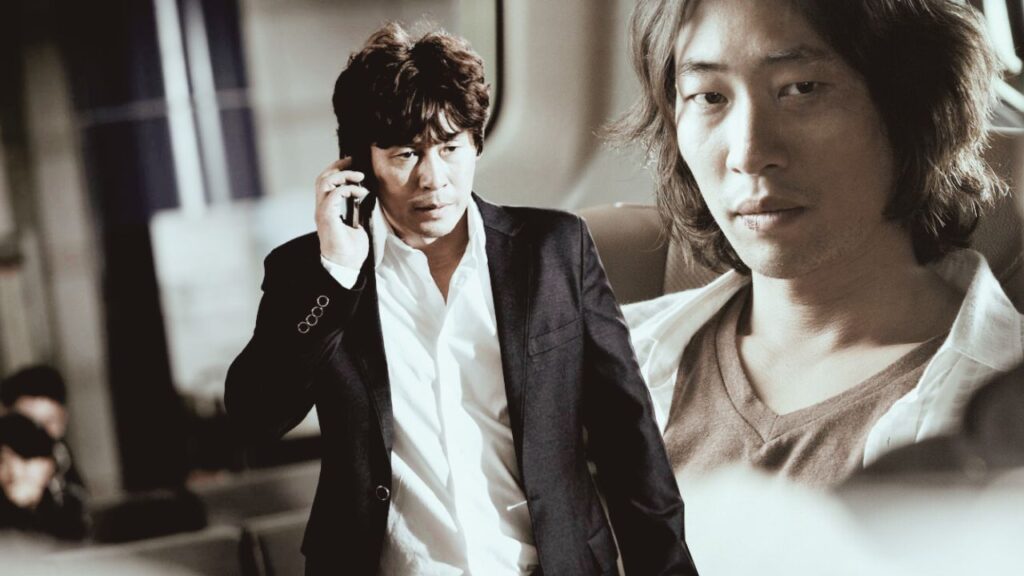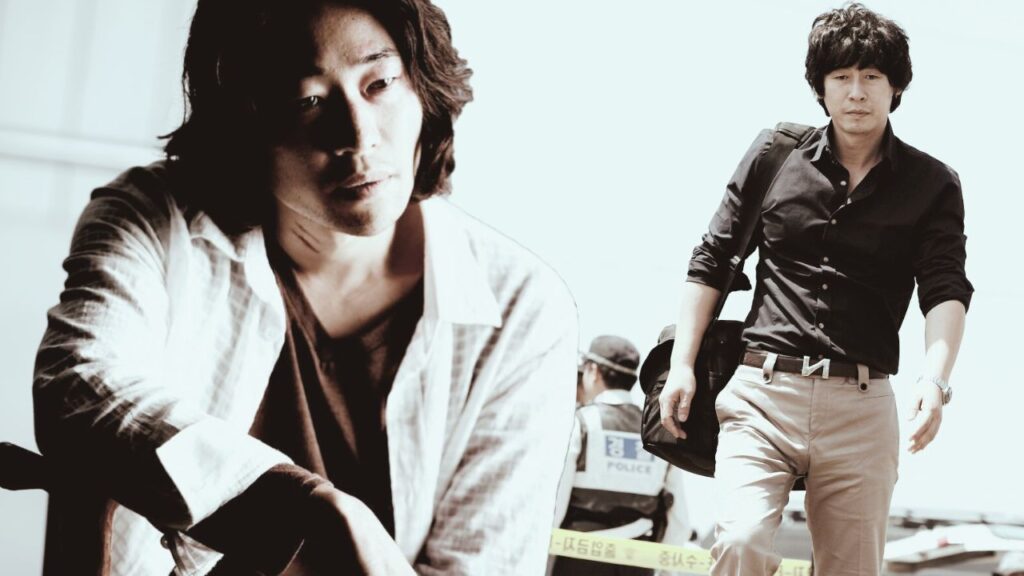This post includes a brief plot summary, an analysis and an explanation about the ending of “No Mercy” (2010). Beware of spoilers.
What if the lines between right and wrong are constantly blurred? In that scenario, does the pursuit of justice justify the extreme means to achieve it? That is the dilemma presented by the director, Park Hoon-jung, in his directorial debut, “No Mercy”. The South Korean thriller stars Sol Kyung-gu as Kang Min-ho and Ryoo Seung-bum as Lee Sung-ho.
“No Mercy” is a high-tension thriller whose plot involves a kidnapped daughter, a serial killer, and an incredible twist.
The protagonist of this story is Kang Min-ho, a well-known forensic pathologist. At the moment, Kang’s life is pretty sweet, he is about to retire and reunite with his daughter, Hye-won, who has been studying overseas. However, his plans have to wait, as his life is about to take a drastic turn.
Shortly after performing an autopsy on a dismembered woman, Oh Eun-ha. He finds out that the prime suspect in this case has his daughter. And now, the killer wants Kang to help him get out of jail in exchange for Hye-won’s release. What does Kang do? He has no option but to comply.
In the process of trying to save his daughter, Kang finds out that he is somehow connected to Lee. Many years ago, Kang performed an autopsy on a girl named Soo-jin, Lee’s sister. At the time, he accepted money from the defendants to omit certain facts in his autopsy report. The men were on trial for rape, but the accusations were eventually dismissed.
Suddenly, all the pieces start to come together. Eun-ha was another key witness in the testimony, and she lied too about the events. So the false testimony, coupled with Kang’s inconclusive report, made Soo-jin look like a promiscuous girl who “wanted it”. Fast forward to the present day, Kang finds himself in another tricky situation when he tampers enough evidence to get Lee out of jail.
Since his sister’s death, Lee has been meticulously planning a revenge plan. The men who hurt Soo-jin are dead, Eun-ha is dead, and Kang seems to be next. Lee takes Kang to his old house, and there the father finds his daughter covered in a pile of roses.
Now, here comes the big plot twist of “No Mercy”: Hye-won never stood a chance, Lee killed her once she landed in South Korea. But that’s not all, Lee swapped the two women’s bodies. This realization triggers pure agony in Kang.
Meanwhile, Lee is chill as a cucumber outside, waiting for Kang. The police arrive and beg Kang not to kill Lee, otherwise, there will be no trial. But Kang cannot help himself, he shoots Lee and then himself. The film “No Mercy” ends with Lee’s quote: “Hating is easy, forgiving is hard”.
“No Mercy” reaches its climax with a brutal ending where redemption was never on the table, only revenge.
From Lee’s merciless actions, it seems that the main antagonist never intended to teach the protagonist a lesson. Lee just wanted to hurt Kang as much as he could. The conclusion of “No Mercy” raises a lot of moral questions, for instance, did Kang “deserve” to have his daughter killed? At this point, Kang’s daughter was just collateral damage.
Lee’s main target was definitely Kang. No matter how many times Kang apologizes to Lee, he will never know the pain and anger that haunt Lee every day since his sister’s death. There are several layers to Lee’s grief: first, there is a feeling of loss; second, there is a feeling of injustice regarding his sister’s death.
Soo-jin is a victim in this story. She was sexually assaulted, then defamed. The town was quick to judge her, which made the aftermath even harder for Soo-jin. In the end, she decided to commit suicide. Having said that, in an indirect way, Kang also contributed to Soo-jin’s death.
The pathologist strongly believes that he’s always been unbiased regarding Soo-jin’s autopsy report, but that’s not completely true. Kang omitted things in the final report. Actually, he wrote two reports.
There are two versions of the forensic report. The first one contained Kang’s true opinions regarding Soo-jin’s death. And in the second one, he purposely omitted certain details to create reasonable doubt. Kang’s justification for his actions was his daughter, Hye-won. At the time, she was ill and needed expensive medical care. Therefore, Kang decided to take the “bribe” from the defendants.
Nonetheless, Kang’s decision was unethical. One cannot trade one life for another. Because Kang wanted to save his daughter, Soo-jin’s reputation had to suffer. The whole town was pointing fingers at her and calling her a whore. Having said that, Lee has a legitimate reason to hate Kang.
Everyone on Lee’s hit list, except Hye-won, did something to deserve their punishment.
The other woman, Oh Eun-ah, also “deserved” to die. Just like Kang, Eun-ah indirectly caused Soo-jin’s demise. It’s implied that she accepted money from the defendants’ rich parents to lie in court. Her statement made Soo-jin look “guilty” because she implied that Soo-jin wanted to be with the rapists.

Soo-jin’s trial exposes the flaws of the justice system, and shows how “selfish” people can be when pushed to their limit.
What Lee did to Kang is no longer seeking justice, but it’s more like an eye for an eye. However, can one blame him? Getting his sister’s rapists to trial just showed him how, as long as someone has money and “power”, they can get away with anything. At the time, even going against Kang would be difficult because of his reputation as a top forensic pathologist.
Kang is not a bad person, but he did something really bad. Although Kang didn’t write lies in the reports, he omitted certain key details that might have put the rapists in jail. Soo-jin was already dead by the time of the trial, but Kang dragged her image into the mud with his testimony. When he alluded to the fact that it was consensual sex instead of rape, he basically set the rapists free.
Lee killed five people (the three rapists, Oh Eun-ah and Hye-won) to avenge his sister’s death. With that many deaths “under his belt”, Lee could be considered a serial killer, but he is not, in the traditional sense. Nevertheless, he is a man in pain, and the hatred in his heart prevented him from moving on with his life.
In “No Mercy” there are no heroes or villains, just people.
The protagonist’s motivation in life is very simple: to live for his daughter. After finding out that Hye-won was dead, Kang died inside. Therefore, he didn’t care about killing Lee and then himself. But Kang didn’t kill Lee just out of anger, it was also an act of mercy.
As mentioned before, Lee was an individual in pain. The hate, just like he said, was like cancer growing inside of him. Therefore, the only way to free himself and get peace was through death. That’s why Kang killed him.
At this point, Kang also put himself in a difficult position. If he hadn’t died, he would’ve gone to jail for tampering with evidence. Therefore, killing Lee seemed appropriate to avenge his daughter’s death. And killing himself was the only way to escape life in prison.
Final Thoughts
“No Mercy” (Yongseoneun Eupda) is a moving thriller with a well-balanced antagonist. Behind Lee’s fake smile lies a very broken individual. His plan was never to get out of it alive. Though he has killed the most people, he might be one of the most innocent characters in the story.
What makes the story of “No Mercy” so unforgettable? The plot twist. It’s so original and poignant. It’s a really heartbreaking scene, the one where Kang realizes the first body belonged to his daughter. That scene perfectly conveyed the disgust and anger he felt for himself. And that was Lee’s plan all the way—the grand finale.
Overall, “No Mercy” (2010) is one of the best films within its genre, with really strong performances from Sol Kyung-gu (Kang) and Ryoo Seung-bum (Lee). The actor who played the antagonist is superb because he makes the audience emphasize with the character’s pain and anger.




